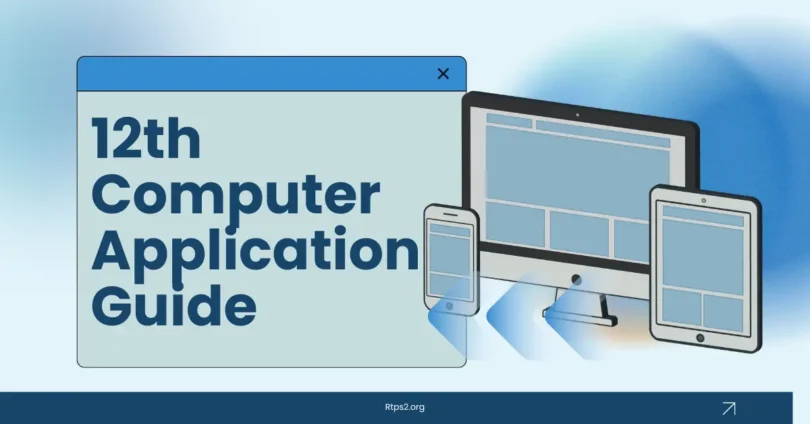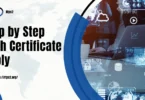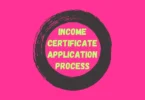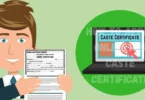The 12th computer application guide is a complete help for students who want to understand this subject in an easy way. It explains the syllabus, study tips, practical work, and exam preparation in simple steps. With this guide, students can learn programming, database, and other computer skills step by step and prepare well for exams.
Overview of the 12th Computer Application Syllabus
The 12th Computer Application syllabus is designed to give students both practical skills and theoretical knowledge. It covers important areas of computer science that are useful for higher education and future jobs. The subject is usually divided into two main parts: theory and practical.
1. Theory Section
The theory part explains the basics of programming, database management, internet concepts, networking, and software tools. Students also learn about IT applications in daily life and the importance of technology in business, education, and communication.
2. Practical Section
The practical part focuses on coding, database handling, and project work. Students get hands-on practice in writing small programs, creating simple databases, and working with application software. This helps them apply what they learn in theory to real situations.
3. Marks Distribution
Most boards give around 70 marks for theory and 30 marks for practicals and projects. This ensures that students not only remember concepts but also know how to use them.
By following the syllabus step by step, students can prepare for exams more effectively and also build strong computer knowledge for future studies.
Key Topics Every Student Must Focus On
The 12th Computer Application guide includes many chapters, but some topics are more important for exams and future learning. Students should give extra time to these key areas:
1. Programming Basics
Learn how to write and understand simple programs. Focus on concepts like variables, loops, functions, and conditional statements. These are the foundation of computer science.
2. Database and SQL
Databases are used everywhere, from mobile apps to websites. Practice writing SQL commands such as SELECT, INSERT, UPDATE, and DELETE. This will help you solve queries in exams and projects.
3. Internet and Web Design
Understanding how the internet works and learning basic web design is very useful. Topics like HTML, CSS, and the basics of websites are often included in the syllabus.
4. Networking Concepts
Learn about types of networks (LAN, WAN), network devices (router, switch), and how data is shared between computers. This is a scoring part of the exam.
5. Office Applications and Tools
Software like word processors, spreadsheets, and presentation tools are also part of the subject. These tools are useful not only for exams but also in daily life and higher studies.
By focusing on these topics, students can cover the most important parts of the syllabus, score good marks, and build strong computer knowledge for their future.
Step by Step Study Plan for Students
A good study plan helps students stay organized and confident. The 12th computer application guide becomes easier when you follow a step-by-step routine. Here’s a simple plan to prepare smartly:
1. Start with the Basics
Begin with programming fundamentals and simple concepts. Understanding basics will make advanced topics easier to learn.
2. Divide Syllabus into Small Parts
Break the syllabus into small sections like programming, databases, networking, and web design. Study one section at a time to avoid confusion.
3. Make a Daily Timetable
Give at least 1–2 hours daily for computer applications. Spend the first half on theory and the second half on practical exercises.
4. Practice Regularly
Computer applications are best learned by doing. Write small programs daily, solve SQL queries, and practice software tools.
5. Revise Weekly
At the end of each week, revise what you studied. Write short notes, highlight key points, and test yourself with small quizzes.
6. Focus on Practical Work
Prepare practical files and projects step by step. Regular practice in the lab will boost confidence for exams.
7. Solve Previous Papers
Use old question papers and sample tests to understand exam patterns. This will help in time management and identifying important questions.
8. Keep Extra Time for Revision
In the last month before exams, revise the entire syllabus at least twice. Focus more on difficult chapters.
By following this simple study plan, students can prepare in an organized way, reduce stress, and perform better in exams.
Easy Learning Tips for Programming
Programming is one of the most important parts of the 12th computer application guide, but many students find it difficult at first. With the right tips, you can make it easier and more fun. Here are some simple ways to learn programming step by step:
- Understand the Logic First
- Before writing code, try to understand what the problem is asking. Think about the steps in plain language. Once the logic is clear, writing the code becomes simple.
- Start with Small Programs
- Begin with easy programs like addition, multiplication tables, or checking even and odd numbers. Small tasks build your confidence and improve your skills.
- Practice Daily
- Programming is like learning a new language you get better only with practice. Write at least one or two programs daily to sharpen your coding skills.
- Learn from Mistakes
- Errors are normal in coding. Don’t get upset when your program doesn’t run. Read the error message carefully and fix it step by step. Every mistake helps you learn.
- Use Flowcharts and Pseudocode
- Draw simple flowcharts or write steps in plain English before coding. This makes the program structure clear in your mind.
- Focus on Important Topics
- Pay more attention to loops, conditional statements, arrays, and functions because they form the base of most exam questions.
- Discuss with Friends or Teachers
- If you get stuck, ask your teacher or discuss with classmates. Sometimes another explanation makes things much easier to understand.
By following these easy tips, students can overcome fear of coding, enjoy programming, and score well in exams.
Best Books and Study Materials for Class 12
Choosing the right books and study materials is very important for scoring good marks in the 12th computer application guide. Good resources make learning simple and help students understand concepts better. Here are the best options:
1. NCERT or Board-Prescribed Textbooks
Always start with the official textbook provided by your board. These books cover the complete syllabus in a simple way and are the main source for exam questions.
2. Reference Books for Extra Practice
Along with the main book, you can use reference books like:
- Computer Applications for Class 12 by Sumita Arora
- Comdex Computer Applications series
These provide extra examples, exercises, and practice questions.
3. Practical Lab Manuals
For the practical section, use lab manuals that explain programming, SQL queries, and project work. These books guide students step by step in preparing practical files.
4. Sample Papers and Question Banks
Many publishers release question banks and sample test papers. These help in understanding exam patterns, practicing time management, and revising important topics.
5. Online Learning Resources
Websites, YouTube tutorials, and free coding platforms like W3Schools or GeeksforGeeks can be used for extra learning. These resources explain topics with examples, which makes them easier to understand.
By using a mix of textbooks, reference books, and online resources, students can prepare more effectively, gain confidence, and score better in exams.
Project Work and Assignments Guide
Project work and assignments are an important part of the 12th computer application guide. They not only carry marks in the exam but also help students apply what they have learned in real situations. Here is a simple guide to handle them effectively:
1. Understand the Project Requirements
Read the instructions given by your teacher or board carefully. Know the topic, the software to be used, and the format in which the project has to be submitted.
2. Choose a Simple and Practical Topic
Select a topic that is easy to understand and manage, such as a library management system, student record system, or billing software. Avoid overly complex projects that can waste time.
3. Plan Before You Start
Make a rough outline of the project. Write down what features it should have, which programming language or database you will use, and how you will organize the work.
4. Work Step by Step
Break the project into small tasks:
- Designing input screens
- Writing the main code
- Adding database connections
- Testing the output
This method will save time and reduce mistakes.
5. Keep Records and Screenshots
While doing the project, save screenshots of each step. These can be added to the project file and will also help in viva exams.
6. Prepare Assignments Carefully
Assignments are usually theory-based. Write answers in clear, simple language. Use diagrams, tables, and bullet points to make your work neat and easy to read.
7. Revise Before Submission
Check for spelling errors, missing steps, or incomplete programs. A clean and complete project file makes a good impression and helps in scoring full marks.
By following these steps, students can complete their projects and assignments with confidence and secure excellent marks in the practical section of the exam.
Exam Preparation Strategy for Success
Success in exams is not just about hard work, it’s about smart preparation. The 12th computer application guide becomes easier if students follow a planned exam strategy. Here are some simple tips:
- Make a Revision Plan
- In the last month before exams, create a timetable that covers all topics. Give more time to difficult chapters but do not ignore the easy ones.
- Revise Theory Daily
- Read important definitions, diagrams, and key points every day. Highlight formulas, SQL commands, and programming rules to revise them quickly.
- Practice Programming Regularly
- Write at least 2–3 programs daily. This will improve speed and reduce mistakes during the exam. Focus on loops, functions, and arrays since they are frequently asked.
- Solve Previous Year Papers
- Go through past papers to understand the type of questions asked. Practice solving them within the exam time limit to improve time management.
- Prepare for Practical Exams
- Revise practical files, project work, and SQL queries. Do a quick check of your coding skills and make sure your project file is neat and complete.
- Use Short Notes for Quick Learning
- Prepare small notes for each chapter. These help in quick revision before the exam and save time.
- Stay Calm and Confident
- Avoid last-minute stress. Sleep well before the exam day, eat healthy food, and keep a positive attitude. A calm mind remembers better.
By following this strategy, students can prepare effectively, reduce exam fear, and score excellent marks in both theory and practical exams.
Career Opportunities After 12th Computer Applications
Studying computer applications in Class 12 opens many doors for higher education and future careers. The skills learned from the 12th computer application guide are useful in almost every field today. Here are some of the best opportunities:
1. Higher Studies in Computer Science
Students can choose courses like BCA (Bachelor of Computer Applications), B.Sc IT, or B.Tech in Computer Science. These courses provide deeper knowledge in programming, software development, and technology.
2. Web and App Development
With basic programming and web design skills, students can start learning advanced web technologies like JavaScript, PHP, and app development. Many companies look for young developers with practical skills.
3. Database Management and IT Support
Knowledge of SQL and database concepts gives students the option to work as database assistants or IT support staff, where they manage data and help organizations with technical issues.
4. Graphic Design and Multimedia
Students interested in creativity can move towards graphic designing, digital media, and animation. Computer applications provide the foundation for using design tools and software.
5. Office and Administrative Jobs
Computer knowledge is a must in every office. Skills in word processing, spreadsheets, and presentation tools help students get jobs in administration, data entry, and business support.
6. Freelancing and Online Work
Students can also start freelancing in areas like content writing, web design, and data handling. With basic computer skills, they can earn money while studying further.
7. Competitive Exams and General Careers
Even if students choose careers outside IT, computer knowledge helps in competitive exams, government jobs, and any profession where technology is used daily.
Computer applications build a strong foundation for higher studies, professional courses, and job opportunities. Students who practice well and improve their skills can have a bright and successful future.
Conclusion
The 12th computer application guide is more than just a subject it is a gateway to modern knowledge and future opportunities. By following the syllabus carefully, practicing programming, completing projects on time, and preparing with a proper study plan, students can perform well in exams and also build strong computer skills for life.
This subject not only helps in scoring good marks but also prepares students for higher studies like BCA, B.Sc IT, and other professional courses. The knowledge of programming, databases, networking, and office tools is useful in almost every career path today.
Success comes with consistent practice, smart preparation, and confidence. If students use this guide step by step, stay focused, and revise regularly, they can achieve excellent results and open the door to a bright future in the world of technology.






